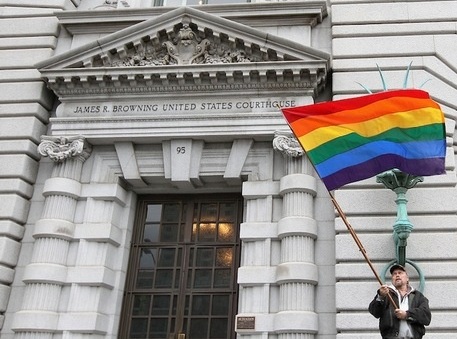An alternative solution to the ongoing Prop 8 battle

Charles Cooper, the lead attorney for supporters of Proposition 8, told Metro Weekly on Tuesday that proponents of the controversial ballot initiative would be seeking an en banc review by the full Ninth Circuit Court of Appeals, which ruled earlier this month that Proposition 8 was unconstitutional.
Despite fierce opposition and garnering national attention, the controversial California initiative was passed by voters in 2008, defining marriage in California as between one man and one woman. Since then, the legislation has had a bumpy ride through the courts, with the Ninth Circuit Court of Appeals ruling on February 7, 2012 via a three-judge panel that the law is unconstitutional and violates the equal protection clause in the Fourteenth Amendment to the U.S. Constitution. Now proponents of the law are seeking a full review of the case in the Ninth Circuit by an 11-judge panel.
As the two sides continue to fight the battle over Prop 8 in the courts, both groups appear to be playing a game of cat and mouse, trying to avoid settling the matter in the Supreme Court where the issue of gay marriage might be federalized-- and settled differently than each side wants. Both groups seem to want to keep the issue local, which makes the legal fight an interesting one to watch. Legal commentators were surprised that proponents of the initiative didn't simply appeal the Ninth Circuit's decision to the Supreme Court. Winning an en banc review by an 11-judge panel will be the first hurdle. Then, if the appeal makes it that far, Prop 8's proponents will have to actually win a case they've already lost twice in court at the District and Appellate levels.
Going this route indicates that the law's supporters are trying to play it safe and resolve the matter without resorting to a Supreme Court ruling that they might not like, and which might federalize that result if the nation's highest court decides there's a positive Constitutional right to gay marriage guaranteed by the Constitution. And it's not just the law's proponents that want to keep this about California instead of "betting the farm" at the Supreme Court level. Gay rights advocates are worried that if the Ninth Circuit smacks Prop 8 down too hard in an 11-judge panel decision, it will arouse the interest of the Supreme Court and federalize a result that they're not happy with. As one columnist put it in the New York Times:
"Many gay rights advocates... had long been wary of the Proposition 8 suit, preferring a state-by-state litigation and lobbying strategy over betting the farm on a case that was likely to end up in the United States Supreme Court. Some said they hoped the justices would now decline to hear an idiosyncratic case affecting a single state."
Nan Hunter, a law professor at Georgetown argues:
"I’ve always thought that the smart thing to do is to win this case for California and to keep this case out of the Supreme Court. In this court at this time, it will be very tough to sell a challenge "
To suggest an Independent solution, that is to say, a solution that would keep the entire issue of marriage independent from the public sphere: why not privatize marriage? Instead of legalizing gay marriage, why not de-legalize straight marriage? Both sides want to keep this issue out of the Supreme Court so that each has a better chance of getting a result they want on a state-by-state basis, but let's follow this logic to its necessary conclusion. Why not keep the issue out of District and Appellate courts too? If not just one, but both sides want to keep the issue from being federalized, why not keep the issue out of state governments as well so that every single individual, couple, and religious community can have a better chance of getting the result they want by deciding the matter for themselves privately? The logic of each side's legal strategy suggests the wisdom of such a solution.




